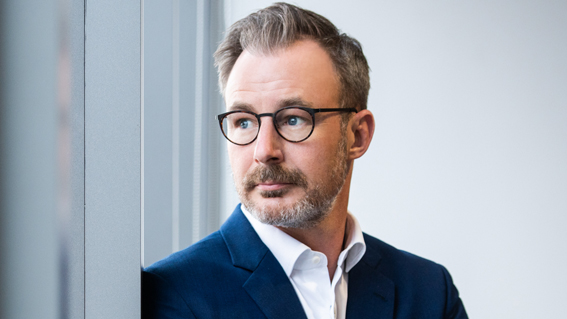But in fact, it is not a moment at all. It takes years of breaking old habits, building new mindsets, and finding role models who can pave the way for old and new career paths with diverse players.
In our Asia Pacific region, two role models — one a mentor, the other a mentee — set off to make that path.
Meet Catherine

‘Do you want a family or career?’
Throughout her career, Catherine was asked this a lot from well-meaning family and friends. It was a constant reminder that a woman can’t have both. “I don’t know if it is this part of the world, being Asian or a woman, but the idea of career mobility was challenging for me.”
Catherine joined Kuehne+Nagel in 2017 as part of the Human Resources (HR) team, heading people development in Malaysia and Singapore. She was at a stage in her career and in her family planning where a decision in one direction felt like it would tip the scales.
Just one year after joining the company, Catherine was nominated to be a mentee in a first-time programme being rolled out in Asia: Pathway through the glass ceiling — a focus on women leadership in the organisation. She felt positive about the programme, but coming from HR, she admits to having a healthy amount of scepticism in agreeing to a female-focused programme.
Meet Casper

‘Are you willing to re-locate?’
Throughout Casper’s career, he has been asked this question on several occasions as part of career progression conversations, to which he almost always answered: Yes. He moved to Canada, Hong Kong, Netherlands, Jordan and now Singapore with his young family during the first ten years of his career.
Today, he is head of the Asia Pacific region for Sea Logistics based in Singapore.
In 2018, Casper was part of several regional meetings to kick-off the Pathway through the glass ceiling programme, a mentorship programme partnering high potential female colleagues with top management — almost all of whom were male. He committed to be a mentor: “The topic is important to me. From my own experience having an international career, there can be some hard choices to make for a family.”
“Our conversations were never about if you could have it all”
Mentors were brought together and provided a framework to guide meaningful conversations. The mentees were flown to Bangkok for three days of kick-off activities.
It was during those days that Catherine was feeling convinced about participating in the programme and the dedication from the company: “They flew all of us to Bangkok. They invited other leaders to speak with us and organised workshops on diversity. It showed me the company was committed to the topic, that they were willing to invest in us.”
Catherine and Casper were informed of their mentor-mentee partnership. Up until this point, their paths had only crossed on wider work topics. This would be the first time they would speak one to one. Because Catherine was often travelling to Singapore for work, she and Casper arranged a dinner to get to know each other better.
They connected quickly. Casper opened up about his career, his personal stories, the struggles he had with his family. At first, he credits this approach to the Danish way of direct communication before adding: “You can’t only talk about ambitions at work when you also have family ambitions. The two are connected. It would have been a mistake not to bring it up.”
In turn, Catherine also opened up to the challenges she was having in understanding career mobility and family planning. Both agreed that this approach — allowing yourself to go deeper — sets the tone to have richer discussions about any decision that influences a career path.
“Our conversations were never about whether you could have it all, but more about the realistic challenges of re-locating, where to position yourself, and what kind of impact re-location has on your career and family,” says Catherine. “It gave me confidence that when the opportunity came, I would be more prepared to make a decision.”
Successes and lessons learned from mentoring
A year after Catherine and Casper embarked on designing a path to break the glass ceiling, Catherine had two big opportunities come into her life: 1) She had a baby and 2) she was offered a leadership position in Taiwan — where she now lives after re-locating there with her family.
“If you prepare people, they are less afraid when the moment comes. They will be able to make that jump,” says Casper.
Casper credits this time with Catherine as an opportunity to challenge his own perceptions, both as a leader and a person: “In any mentorship programme, the learning should go both ways. Whatever I can do to achieve and support the building of a more balanced work place, where diversity is part of my surroundings, the wiser I become as a leader.”
Although it might feel uncomfortable at first, Catherine and Casper both agree how important it was for both of them to show their vulnerabilities. Especially because it first came from Casper: “As a senior leader, I don’t think you can have these discussions without showing vulnerability. If I don’t share, why on earth would you?”
Today, many things have come full circle. The programme is welcoming its second cohort of mentees and mentors and Catherine was recently approached by someone else in the organisation asking similar questions she had asked Casper about career mobility.
In Catherine’s experience, a good role model is someone who is willing to show vulnerability and is generous with their time. With those ingredients, you set the right tone for your pragmatic questions on career growth: “Having an opportunity to get to know someone on a senior level is already a great experience, but at that deeper level, personal level, it feels very human,” says Catherine.
In an ideal world, you focus on human leadership instead of talking about gender imbalances in leadership. But many companies are not there yet. Programmes like Pathway through the glass ceiling are the preparatory work, the ongoing trainings that are paving the way for a new mindset. They give us opportunity to practice identifying, speaking and taking action on our own biases as individuals and as a company.
Those biases are what create a glass ceiling – an unseen barrier of gender-based career norms that keeps women from reaching leadership and executive roles.




